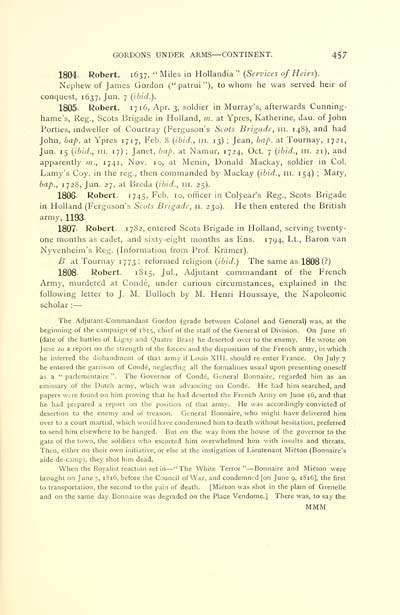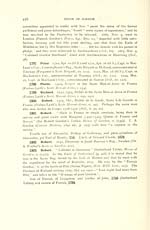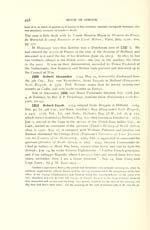New Spalding Club > House of Gordon > Gordons under arms
(547) Page 457
Download files
Complete book:
Individual page:
Thumbnail gallery: Grid view | List view

GORDONS UNDER ARMS — CONTINENT. 457
1804- Robert. 1637, " Miles in Hollandia " (Services of Heirs).
Nephew of James Gordon ("patrui"), to whom he was served heir of
conquest, 1637, Jun. 7 {ibid.).
1805- Robert. 1716, Apr. 3, soldier in iVIurray's, afterwards Cunning-
hame's, Reg., Scots Brigade in Holland, in. at Ypres, Katherine, dau. of John
Forties, indweller of Courtray (F"erguson's Scots Brigade, in. 148), and had
John, bap. at Ypres 1717, Feb. 8 [ibid., iii. 13) ; Jean, bap. at Tournay, 1721,
Jun. 15 [ibid.. III. 17) ; Janet, bap. at Namur, 1724, Oct. 7 {ibid., in. 21), and
apparently in., 1741, Nov. 10, at Menin, Donald Mackay, soldier in Col.
Lamy's Coy. in the reg., then commanded by Mackay (ibid., in. 154) ; Mary,
bap., 1728, Jun. 27, at Breda (ibid., in. 25).
1806- Robert. 1745, Feb. 10, officer in Colyear's Reg., vScots Brigade
in Holland (Ferguson's Scots Brigade, u. 230). He then entered the British
army, 1193.
1807- Robert. 17S2, entered Scots Brigade in Holland, serving twenty-
one months as cadet, and sixty-eight months as Ens. 1794, Lt., Baron van
Nyvenheim's Reg. (Information from Prof. Kramer).
B at Tournay 1773; reformed religion (ibid.) The same as 1808 (?)
1808- Robert. 1815, Jul., Adjutant commandant of the French
Army, murdered at Conde, under curious circumstances, explained in the
following letter to J. M. Bulloch by M. Henri Houssaye, the Napoleonic
scholar : —
The Adjutant-Commandant Gordon (grade between Colonel and General) was, at the
beginning of the campaign of 1815, chief of the staff of the General of Division. On June 16
(date of the battles of Ligny and Quatre Bras) he deserted over to the enemy. He wrote on
June 20 a report on the strength of the forces and the disposition of the French army, in which
he inferred the disbandment of that army if Louis XIU. should re-enter France. On July 7
he entered the garrison of Cond^, neglecting all the formalities usual upon presenting oneself
as a " parlementaire ". The Governor of Cond^, General Bonnaire, regarded him as an
emissary of the Dutch army, which was advancing on Conde. He had him searched, and
papers were found on him proving that he had deserted the French Army on June 16, and that
he had prepared a report on the position of that army. He was accordingly convicted of
desertion to the enemy and ol' treason. General Bonnaire, who might have delivered him
over to a court martial, which would have condemned him to death without hesitation, preferred
to send him elsewhere to be hanged. But on the way from the house of the governor to the
gate of the town, the soldiers who escorted him overwhelmed him with insults and threats.
Then, either on their own initiative, or else at the instigation ot Lieutenant Milton (Bonnaire's
aide-de-camp), they shot him dead.
When the Royalist reaction set in — "The White Terror" — Bonnaire and Miiton were
brought on June 5, 1S16, before the Council of War, and condemned [on June g, 1816], the first
to transportation, the second to the pain of death. [Milton was shot in the plain of Grenelle
and on the same day Bonnaire was degraded on the Place Vendome.] There was, to say the
MMM
1804- Robert. 1637, " Miles in Hollandia " (Services of Heirs).
Nephew of James Gordon ("patrui"), to whom he was served heir of
conquest, 1637, Jun. 7 {ibid.).
1805- Robert. 1716, Apr. 3, soldier in iVIurray's, afterwards Cunning-
hame's, Reg., Scots Brigade in Holland, in. at Ypres, Katherine, dau. of John
Forties, indweller of Courtray (F"erguson's Scots Brigade, in. 148), and had
John, bap. at Ypres 1717, Feb. 8 [ibid., iii. 13) ; Jean, bap. at Tournay, 1721,
Jun. 15 [ibid.. III. 17) ; Janet, bap. at Namur, 1724, Oct. 7 {ibid., in. 21), and
apparently in., 1741, Nov. 10, at Menin, Donald Mackay, soldier in Col.
Lamy's Coy. in the reg., then commanded by Mackay (ibid., in. 154) ; Mary,
bap., 1728, Jun. 27, at Breda (ibid., in. 25).
1806- Robert. 1745, Feb. 10, officer in Colyear's Reg., vScots Brigade
in Holland (Ferguson's Scots Brigade, u. 230). He then entered the British
army, 1193.
1807- Robert. 17S2, entered Scots Brigade in Holland, serving twenty-
one months as cadet, and sixty-eight months as Ens. 1794, Lt., Baron van
Nyvenheim's Reg. (Information from Prof. Kramer).
B at Tournay 1773; reformed religion (ibid.) The same as 1808 (?)
1808- Robert. 1815, Jul., Adjutant commandant of the French
Army, murdered at Conde, under curious circumstances, explained in the
following letter to J. M. Bulloch by M. Henri Houssaye, the Napoleonic
scholar : —
The Adjutant-Commandant Gordon (grade between Colonel and General) was, at the
beginning of the campaign of 1815, chief of the staff of the General of Division. On June 16
(date of the battles of Ligny and Quatre Bras) he deserted over to the enemy. He wrote on
June 20 a report on the strength of the forces and the disposition of the French army, in which
he inferred the disbandment of that army if Louis XIU. should re-enter France. On July 7
he entered the garrison of Cond^, neglecting all the formalities usual upon presenting oneself
as a " parlementaire ". The Governor of Cond^, General Bonnaire, regarded him as an
emissary of the Dutch army, which was advancing on Conde. He had him searched, and
papers were found on him proving that he had deserted the French Army on June 16, and that
he had prepared a report on the position of that army. He was accordingly convicted of
desertion to the enemy and ol' treason. General Bonnaire, who might have delivered him
over to a court martial, which would have condemned him to death without hesitation, preferred
to send him elsewhere to be hanged. But on the way from the house of the governor to the
gate of the town, the soldiers who escorted him overwhelmed him with insults and threats.
Then, either on their own initiative, or else at the instigation ot Lieutenant Milton (Bonnaire's
aide-de-camp), they shot him dead.
When the Royalist reaction set in — "The White Terror" — Bonnaire and Miiton were
brought on June 5, 1S16, before the Council of War, and condemned [on June g, 1816], the first
to transportation, the second to the pain of death. [Milton was shot in the plain of Grenelle
and on the same day Bonnaire was degraded on the Place Vendome.] There was, to say the
MMM
Set display mode to: Large image | Transcription
Images and transcriptions on this page, including medium image downloads, may be used under the Creative Commons Attribution 4.0 International Licence unless otherwise stated. ![]()
| Publications by Scottish clubs > New Spalding Club > House of Gordon > Gordons under arms > (547) Page 457 |
|---|
| Permanent URL | https://digital.nls.uk/79787261 |
|---|
| Description | Volumes 47-53 are uniform with but not part of the club's series. |
|---|---|

